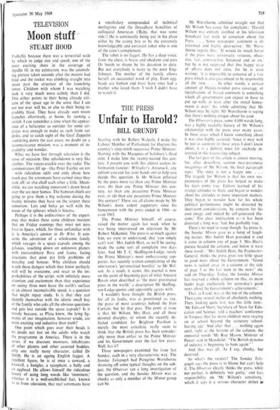Moon stuff -
TELEVISION
STUART HOOD Probably because there was a terrestrial scale by which to judge size and speed, one of the most exciting shots in the coverage of Apollo 10, in my estimation, was the astonish- ing picture taken seconds after the motors had fired and the rocket was climbing straight into space past the structure of the launching tower. Children with whom 1 was watching took it very much more calmly than I did. This either points to their being already citi- zens of the space age in the sense that I am not nor ever will be, or else to their being in- credibly blasé. They have already seen moon launches effortlessly, at home, by turning a switch. I can remember a time when the appear- ance of a helicopter as outrider for some air- circus was enough to make us rush from our desks, and to catch sight of the Graf Zeppelin sauntering down the east coast, no doubt on a reconnaissance mission, was a moment of in- credulity and wonder.
What we have lost through television is the sense of occasion. One splashdown is very like another. The voices crackle over the radio. The commentators fill up—like Peter Fairley on ITN -with ridiculous odds and ends about how much pay the astronauts have earned since they took off; or else chaff each other a little. Mean- while, we are watching tomorrow's dawn break over the sea near Samoa. The Samoan chiefs are going to give them a big welcome during the twenty minutes they have on the airport there tomorrow. Leis and hulas go well with the music of the spheres; which is Sinatra.
Perhaps it is the ordinariness of the experi- ence that makes these same children insistent that on Friday evenings they must not miss Lost in Space, which, for those unfamiliar with it, is America's answer to Dr Who. It con- cerns the adventure of a wholesome family which voyages in a space capsule among the galaxies, touching down on unknown planets with extraordinary flora and fauna, facing, situations that pose pat little problems of morality and honour. Why children should watch these dangers which they know perfectly well will be overcome, and react to the im- probabilities of the script, with infinitely more attention and excitement than they experience on seeing three men leave the earth's surface at an almost inconceivable speed, is a question that might repay study. Is it that they can identify themselves with the idiotic small boy of the family who asks all the obvious questions and gets lost outside the space capsule? Is it merely because, as Plato knew, the lying fig- ments of our imagination, however crude, are more exciting and seductive than truth?
One point which goes over their heads is no doubt not lost on the adults who watch the programme in America. There is in the series, if we discount monsters, inhabitants of other planets and other assorted baddies, only one really nasty character, called Dr Smith. He is an ageing English faggot. A repellent figure, he is at once a coward, a knowall, a bungler, a sycophant, a bully and an egghead. He allows himself the ridiculous luxury of using long words like 'imminent,' Whereas it is a well-established • fact, known to us from television, that real astronautshave a vocabulary compounded of technical neologisms and the threadbare banalities of colloquial American. ('Baby, that was some ride.) He is continually being put in his place either by the young boy or by the extremely knowledgeable and extravert robot who is one of the crew's complement.
The robot is no faggot. He has a deep voice, from the chest, is brave and obedient and puts Dr Smith to shame by his devotion to duty. But not everybody is nasty to the poor Eng- lishman. The mother of the family allows herself an occasional word of pity. Even egg- heads are human and must have once had a mother who loved them. I wish I didn't have to watch it.


































 Previous page
Previous page